Antibody (Suitable for clinical applications)
| Specification | Recommendation |
|---|---|
| Recommended Dilution (Conc) | 1:25-1:50 |
| Pretreatment | No Pretreatment Required |
| Incubation Parameters | 30 min at Room Temperature |
Prior to use, inspect vial for the presence of any precipitate or other unusual physical properties. These can indicate that the antibody has degraded and is no longer suitable for patient samples. Please run positive and negative controls simultaneously with all patient samples to account and control for errors in laboratory procedure. Use of methods or materials not recommended by enQuire Bio including change to dilution range and detection system should be routinely validated by the user.
Thyroglobulin Information for Pathologists
Summary:
Large glycoprotein (MW 670K) produced by thyroid follicular cells; later iodinated to form T3 and T4. Specific marker of thyroid differentiation. Microscopic (histologic) images Images hosted on PathOut server:.
| Thyroglobulin General Information | |
|---|---|
| Alternate Names | |
| Molecular Weight | |
| 304.8 kDa | |
| Chromosomal Location | |
| q24.22 [chr: 8] [chr_start: 132866958] [chr_end: 133134903] [strand: 1] | |
| Curated Database and Bioinformatic Data | |
| Gene Symbol | TG |
| Entrez Gene ID | 7038 |
| RefSeq Protein Accession(s) | NP_003226; XP_016869284 |
| RefSeq mRNA Accession(s) | XM_017013794; XM_017013800; XM_006716622; NM_003235; XM_017013795; XM_017013798; XM_005251040; XM_017013799; XM_017013793; XM_005251038; XM_017013796; XM_017013797; XM_005251042 |
| RefSeq Genomic Accession(s) | NG_015832; NC_000008 |
| UniProt ID(s) | P01266 |
| PharmGKB ID(s) | PA36479 |
| KEGG Gene ID(s) | hsa:7038 |
| Associated Diseases (KEGG IDs) | Thyroid dyshormonogenesis 3 (TDH3) [MIM:274700]: A disorder due to thyroid dyshormonogenesis, causing large goiters of elastic and soft consistency in the majority of patients. Although the degree of thyroid dysfunction varies considerably among patients with defective thyroglobulin synthesis, patients usually have a relatively high serum free triiodothyronine (T3) concentration with disproportionately low free tetraiodothyronine (T4) level. The maintenance of relatively high free T3 levels prevents profound tissue hypothyroidism except in brain and pituitary, which are dependent on T4 supply, resulting in neurologic and intellectual defects in some cases. {ECO:0000269|PubMed:10199792, ECO:0000269|PubMed:16477365, ECO:0000269|PubMed:17244789, ECO:0000269|PubMed:17532758, ECO:0000269|PubMed:19509106, ECO:0000269|PubMed:27305979}. The disease is caused by mutations affecting the gene represented in this entry.; Autoimmune thyroid disease 3 (AITD3) [MIM:608175]: A complex autoimmune disorder comprising two related diseases affecting the thyroid: Graves disease and Hashimoto thyroiditis. In both disorders, thyroid-reactive T-cells are formed and infiltrate the thyroid gland. In Graves disease, the majority of the T-cells undergo a Th2 differentiation and activate B-cells to produce antibodies against the TSH receptor, which stimulate the thyroid and cause clinical hyperthyroidism. In contrast, Hashimoto thyroiditis is characterized by Th1 switching of the thyroid-infiltrating T-cells, which induces apoptosis of thyroid follicular cells and clinical hypothyroidism. {ECO:0000269|PubMed:14657345}. Disease susceptibility is associated with variations affecting the gene represented in this entry. |
| General Description of Thyroglobulin . | |
| This antibody recognizes thyroglobulin in hyperplastic and neoplastic thyroid. Thyroglobulin is a protein of 670 kDa consisting of two identical subunits. Thyroglobulin is synthesized by the follicular epithelial cells of the thyroid. | |



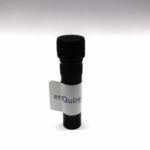
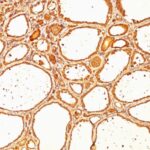
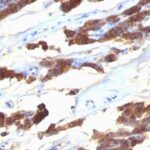
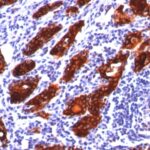
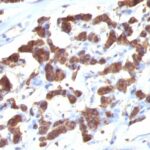
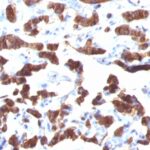
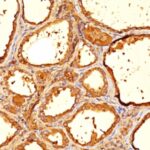
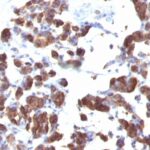

There are no reviews yet.